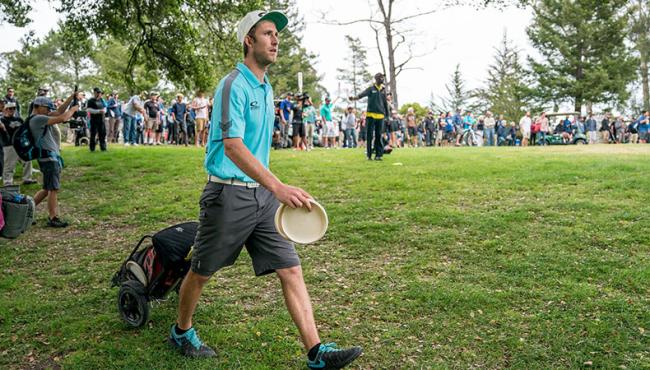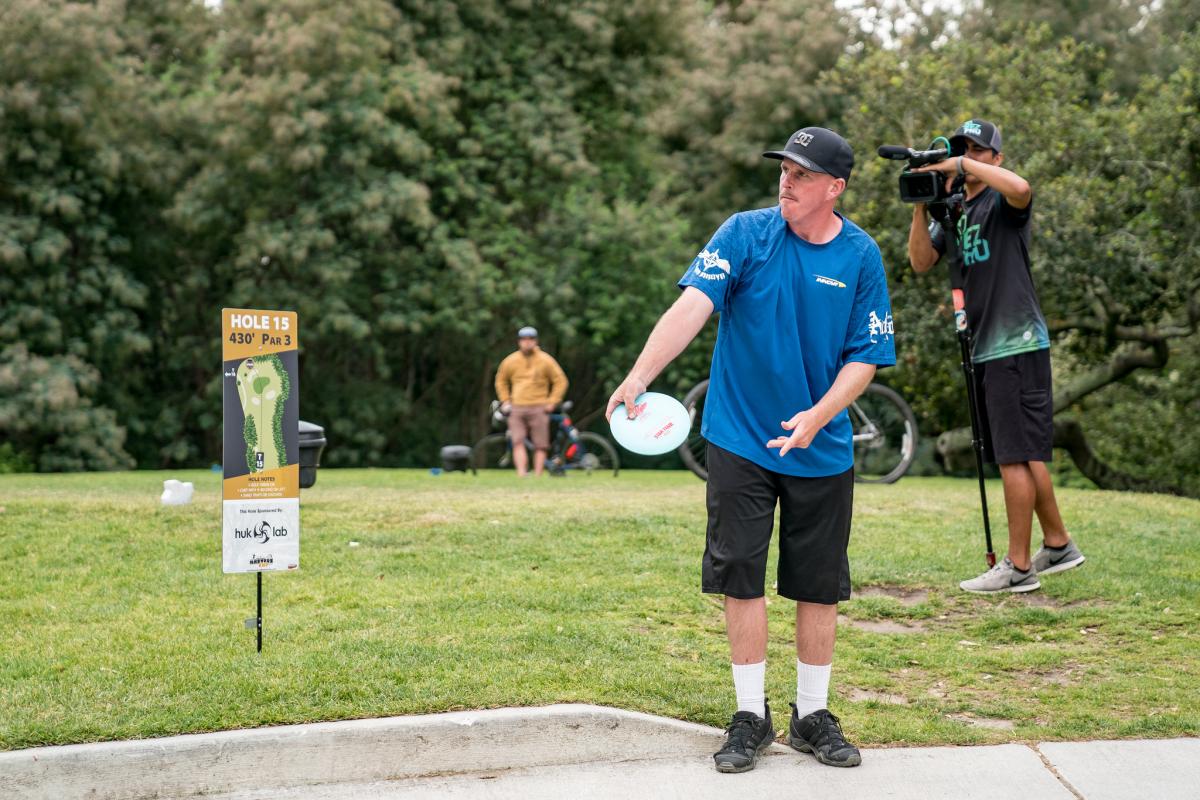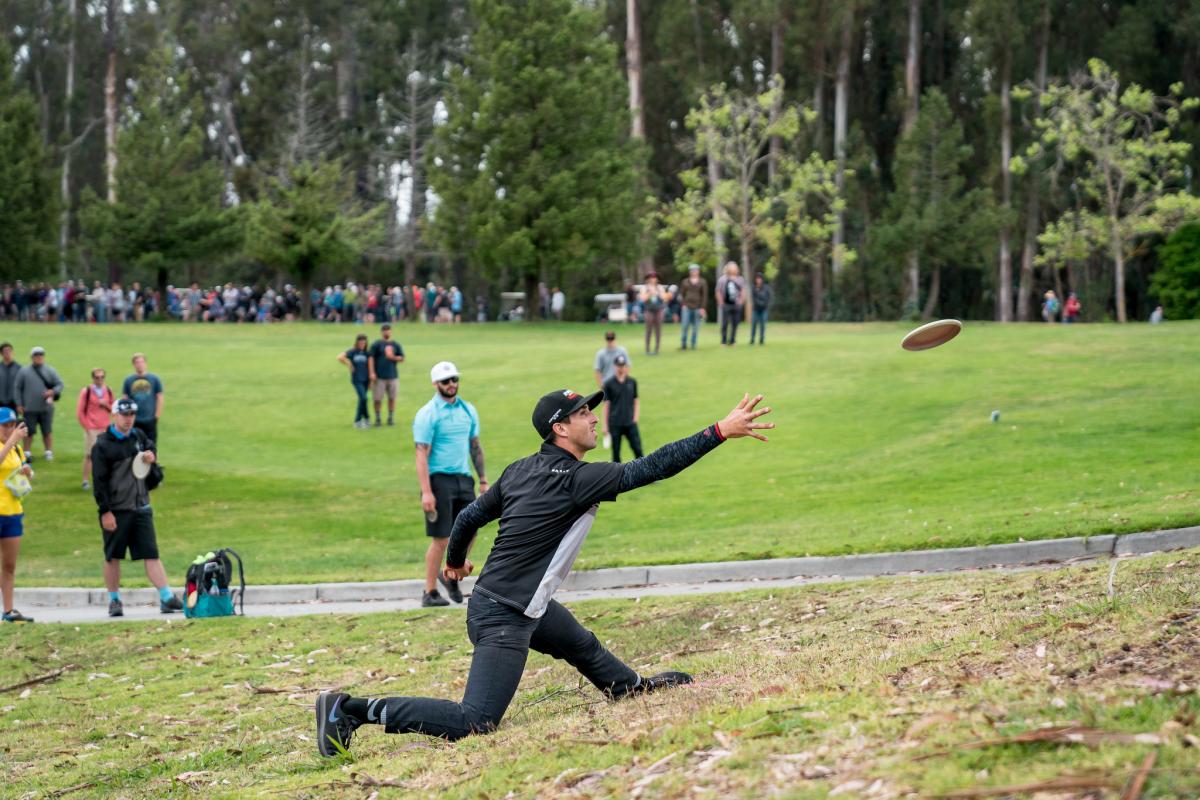Wysocki Wins Another Masters Cup Roller Coaster Ride
Wysocki Wins Another Masters Cup Roller Coaster Ride
Anthon battles to second, while McBeth rockets into third place

Ricky Wysocki won his second career Santa Cruz Masters Cup after a wild final round at the DeLaveaga Golf Course. Photo: Alyssa Van Lanen
SANTA CRUZ, Calif. – The famed Beach Boardwalk and its landmark Giant Dipper make for a bucolic skyline here in this seaside enclave, but for yesterday afternoon’s final round of the Masters Cup it was as if Ricky Wysocki and Josh Anthon picked up the red and white wooden roller coaster and transplanted it to the fairways of the DeLaveaga Golf Course.
Up, down, and all around the scorecard the birdies and bogeys flew, with competitors tilting back and forth between euphoria and holding on for dear life. When the ride finally pulled into the station, it was the reigning PDGA World Champion who ended up with the most fun.
Wysocki’s 6-under par 54 Sunday was enough to overcome two out-of-bounds shots and a late-round stroke penalty for a foot fault, as he collected his second career Masters Cup victory and a $4,000 purse with a 20-under par 184 total. Anthon’s final round 3-under par 57 left him in second place with an 18-under par 186, while five-time Masters Cup Champion Paul McBeth pushed his hardest to make it six, jumping up 19 spots on the leaderboard with a 10-under par flourish to finish in third place at 17-under. Philo Brathwaite notched his highest finish at a National Tour event since 2013 at this same tournament, taking fourth place with a 16-under par 188, while four players – Eagle McMahon, Austin Hannum, Nate Sexton, and Noah Meintsma – tied for fifth place with 15-under par 189s.
The victory was Wysocki’s second in 2018, and it found him reflecting on the continued maturation of a game that allows him to overcome even his most inconsistent performances.
“I’ve been in this situation so many times that I know you’re not always gonna have your best round in the final round as much as you want to,” Wysocki said. “You’ve got to be able to win in so many different scenarios. I think that I’m able to do that because I’ve played and I’ve won in playing my best and my worst. I’m able to salvage my bad rounds and really put the pedal to the metal on my good rounds. I think that that’s where I gained a good advantage, in being able to close in tournaments like this.”
From the outset, though, it didn’t seem like Wysocki was going to endure much difficulty. He came out of the gates firing, landing a 40-foot deuce from the dense brush deep of hole 1’s basket, then rattled off five consecutive birdies from holes 3 through 7. Anthon struggled to get much going, landing short of the pin or off the fairway on the first three holes and only managing pars. He finally carded his first birdies with parked shots on holes 5 and 6, but gave one of those away after driving out of bounds on the par 4 7th. He managed to connect on a 38-footer to save bogey, though, and limited the damage.
Still, Wysocki had earned a three-shot lead and was clearly sitting in the front seat of the coaster.
Then, he started to hit those stomach-dropping sections of the ride.
Wysocki put too much juice on an Enforcer for his drive on hole 9, and it held straight and finished on the out-of-bounds green. He couldn’t connect for the par save from 80 feet and took his first bogey of the day. He added another on the 800-foot, par 4 12th when he again failed to convert from long-range.
“It was really hard for me to stabilize,” Wysocki said. “I had a lot of bogeys and a lot of fours out here. It was a really up and down round. Josh would gain two strokes, there’s two-stroke swings and one-stroke swings on almost every hole. It was really a roller coaster ride.”
The most significant of those swings came at the most inopportune time for Wysocki. He took a two-shot margin over Anthon into the 430-foot 15th, which finds the pin closely guarded by a sand trap that plays as a hazard. Wysocki launched his shot into the pit, meaning he was already sitting on his third shot. After the drive, though, Brathwaite called Wysocki for a foot fault, and Meintsma seconded it.
Wysocki amassed two penalty strokes on one throw, then converted on his 15-footer from the sand trap for a two-throw bogey. Anthon, meanwhile, canned a 40-footer uphill for a two-shot, lead-tying swing.
As it turns out, this ruling was applied incorrectly. Per the PDGA Official Rules of Disc Golf Question and Answer section OB6, a player cannot receive more than one penalty stroke on a single throw. Wysocki should have only been assessed one penalty for either the foot fault or the hazard, which would have resulted in an incorrect scorecard at the end of play. Since this error was not caught until the event was completed, though, rule 808.G.1 applies and no more penalty strokes may be assessed. Wysocki won by two strokes, and even if he were to have the penalty for a scoring error added he still would have been victorious by a single stroke.
Needless to say, the whole situation, correct or not, added to a hectic round.
“It definitely deflated me a little bit,” Wysocki said. “…It changed the dynamic to be in Josh’s favor. That was the biggest thing about that hole that really was hard to overcome. I was just glad I didn’t let it get to me as much.”

Josh Anthon went down fighting, but a late OB throw cost him the win. Photo: Alyssa Van Lanen
Though he benefitted from the penalty, Anthon said he was not in a position to confirm the call.
“I never witnessed it – I’ve gotta pay attention more,” he admitted. “With the new rule its definitely a huge thing, people have to watch their footing. Ricky took it like a champ and moved on and didn’t argue it. He took his stroke and moved on to the next hole.”
The pair pushed with birdie 3s on the 755-foot 16th and took their stalemate to hole 17, which features an island green with an elevated pin and the only cart path on the course that plays as on OB river. Anthon was first to tee and skipped his shot wide left and onto the cart path, where it stayed. Wysocki landed short of the island but safe, then pitched up for an easy par. Anthon missed his par save from the drop zone and fell one stroke behind with one to play.
The miscue, ultimately, was Anthon’s undoing.
“Hole 17, I’m not a fan of it having that path right there and throwing the best shot of the group and sitting there on the path OB,” Anthon said. “They just go one path OB, one not. But [tournament staff] put a lot of work out here and they did that to make certain holes challenging, and certain holes applied to it. I appreciate all their work, but it is still frustrating to lose the tournament that way.”
Still, Anthon went down swinging. Wysocki tossed a wide hyzer downhill on the 485-foot finishing hole to avoid the murky pond that swallowed many a disc throughout the tournament – including Anthon’s. He launched a high drive toward the green, mustering all the effort he could to somehow park the shot, but it stalled out and splashed. Wysocki pitched up for the win.
About a half hour before the thrill of the final, McBeth nearly made his own heroic charge at the top. He said before the round, when he was in 22nd place, that he’d have to shoot 1100 to have a chance at the comeback. He got on the right track early with a five-birdie run, then hit another four in succession on the back nine. But his momentum stalled on hole 15, when he missed a bid for 2 low off the cage, and again on 16, when the wind pushed down an aggressive drive and he went too high on a birdie run from 60. Still, the 1070-rated performance tied for the hot round of the day and helped him earn a couple more thousand dollars than he was looking at in the morning.
“Yeah, winning would have been nice,” McBeth said. “But you know, I had to play super aggressive today, and I did, and our whole card did. The whole card [including Simon Lizotte, Drew Gibson, and Scott Withers] was trying to play aggressive, and we weren’t caring about pars or bogeys, you know? We were shooting for birdies, so it was really easy to stay in that groove with the people I was around.”

Another final round flourish pushed Paul McBeth to third place. Photo: Alyssa Van Lanen
Though he has traditionally slayed DeLaveaga, McBeth wasn’t ready to panic about his two rounds up the hill that clocked in at an average of 25.5 points below his rating.
“I mean, DeLa – it’s like if you’re barely off, you’re way off. But if you’re way off, you’re barely off,” McBeth said. “You’re airballing putts and you’re being safe, but you’re barely making the basket you’re 70 feet down the hill. That’s how the first two days were – I was just barely off, hitting them, rolling away, taking bogeys – to where here [at the golf course] if you’re doing that you’re not rolling away the same way. It’s hard to say how I off I really was the first two days, but it was just barely.”
Brathwaite, who hit four putts from circle 2 to keep himself in contention on the lead card, was still disappointed he didn’t get to take a third crack at the disc golf course, which he feels better suits his game. Still, the tournament constituted his best performance of 2018 at a premier event, and he was hoping to roll that into some bigger finishes this summer.
“Just playing as well as I did the first two rounds on a course that’s more my style is a bit of a confidence booster,” Brathwaite said. “Even though it didn’t go my way, I didn’t let it snowball into like the complete self-destruction and loss of confidence or loss of focus. Yeah, I made some not so good plays and I didn’t really like that, and a couple times the wind got me really bad. Everybody was dealing with it.”
If a veteran like Brathwaite finds a bump in self-esteem from his finish, imagine what it does for a young player like Meintsma. Though the 20-year old Minnesotan was smarting from finishing bogey-bogey, flashed a variety of skills throughout the round and weathered the pressure of lead-card status. His park job for an easy birdie with a softly landing Leopard on hole 1 stood out for its pure accuracy, and his birdie putt through the trees on hole 9 was worthy of a highlight reel. His fifth place showing was a career best on the National Tour and a strong start to his first real run of travel outside his home state.
“This will be awesome,” Meintsma said. “This is my first month-long mini tour – I’m going on to SFO next and Beaver State. This is definitely a great first stop on my trip. I won a C-Tier last weekend in Minnesota against Cale [Leiviska] and Alex Geisinger, one of the really good pros, so that was my first tournament in Minnesota of the year. So it feels good to get the win and get top 5 at the NT, so that’s good.”
Wysocki said he was impressed with Meintsma’s skill set and the new crop of young players who are starting to give him and some of the other touring vets a run for their money each weekend.
“It definitely keeps me on my toes,” Wysocki said with a laugh. “But it’s definitely something that is good for the game to see the young kids come up and to see there’s more potential, and there a lot of players that can play at a high level.”
Perhaps Wysocki will need to start making more room at the front of the roller coaster, then.
This aritcle was updated at 3:44 p.m. PT on May 21, 2018, to add clarifying information about Wysocki's foot fault penalty.

Comments
The situation with Ricky’s
The situation with Ricky’s foot fault and hazard penalties may seem peculiar in this instance, but, we ought not imagine that we won’t have to deal with some of the issues again. Most concerning is the ease with which people have theoretically assigned scoring blame and 2 addition strokes to Ricky for having accepted the mindful acts of the player group to assess 2 play related penalty strokes on hole 15. Setting aside for the time being my arguments that unsupported QA answers are not consistent with the expressed rule defining a throw and the appropriate grouping of penalties incurred by a throw, the supposed failure to set aside the penalty incurred by the throw’s landing in the hazard was a function of the entire card and any officials who witnessed the whole thing. Where those people acted out of ignorance, as they perhaps expressed their views concerning the two penalty assessment, and , as they certainly heard the scorekeeper announce the score for that hole, they also carried that ignorance with them past the TD’s closing of the event. It simply offends our basic notions of fairness that the rule concerning scorecard accuracy has been so casually applied in this discussion. It occurs today that there is no effect on Ricky’s title. But that does not change our recognition that the PDGA seems prepared to punish future single victims of a group rule misinterpretation. ( A partial return of the whole-card penalty for scoring failures due to rules mishaps is not my direct appeal here.) Did no one thoroughly consider Rule 808.G. 2 where it recognizes the TD’s ability to change a score without assessing those 2 points? What great stretch of prerogative is there when the change is a matter of a TD’s subtraction instead of addition. Can it be possible that the failure to observe the rules in a way that results in turning in a score that is too low is a more persuasive call for relief from an extra 2 strokes than a case where the score that is turned in is too high? Please look at 805.03.D for a score subtraction and consider that as a case where no scoring penalty is assessed. A similarly liberal construction of 808.G.2 should have been applied in the Ricky opinion. Finally, this miscarriage occurs as a gratuitous leadership contribution to a resolved matter.